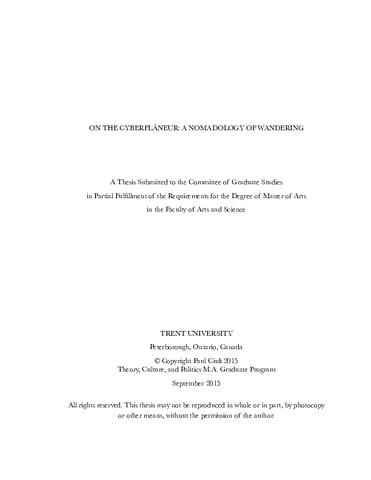Creative writing
For the Road. Towards a definition of Counterculture
For the Road is a study of the modes of transmission of ideas within the Counterculture in its different forms. It is a genealogy of movements that define themselves "against" what is established as "Culture". The philosophy of the Beat Generation does not come out of nowhere and in turn, many recent movements are indebted to the Beat Generation. The goal of this dissertation is to formulate a theory of Counterculture as a whole using various "lenses" such as Comparative Literature and Cultural Studies. The foundation of the argument starts with the Beat Generation. The Beats, often perceived as the founding fathers of the Counterculture had predecessors. The first parts of this dissertation deal with the idea of transmission and the way the Beats reformulated the ideas of their predecessors to make these ideas relevant again in the context of the mid-twentieth century. The dissertation then deals with the successors of the Beats who themselves reformulated the ideas that the Beats had once "re-invented" in the context of the late twentieth century and the beginning of the twenty-first. The dissertation then shifts to a much wider understanding of the notion of Counterculture. The Counterculture has always existed and its incarnations have either faded away or have been co-opted by the impersonal forces of mainstream Culture. The last part of the dissertation, the creative writing project, is an attempt to re-create a Counterculture, one that would always have the potential to be born again while remaining free from the shackles of mainstream Culture. This last part puts theory into practice, using such concepts as Barthes' death of the author and Proudhon's reinvention of the concept of property, including intellectual property.
Author Keywords: Counterculture, Ginsberg, Influence, Kerouac, Outsiders, Revolution
Story is Medicine: Opioid Addiction: Healing and Hope through a 'Two-Eyed Seeing' Framework
This is a story within a story that spans over a hundred years and four generations. It takes the reader from war-torn Russia during a famine to the urban streets of Toronto and then to the Canadian North. The story is a memoirette, or a 'not quite long enough, but almost a memoir' of a mother's journey navigating life after her son discloses his addiction to Fentanyl. The mother finds little if any support from family, friends or conventional support programs and instead turns to her oma's harrowing stories of survival as a source of knowledge, strength and medicine. The analysis explores storytelling as a legitimate method of learning, pedagogy and research. It explores the concept of story as medicine through Etuaptmumk. A Two-Eyed Seeing framework created by Mi'kmaq elders in 2004 (Sylliboy, Latimer, Marshall & McLeod, 2009). The power of the narrative is discussed through 'Western' and 'Indigenous' lenses.
Author Keywords: addiction, Etuaptmumk, Fentanyl, story as medicine, story as pedagogy, Two-Eyed Seeing
This Is It, I Guess: Creating a Forward-Thinking Queer Narrative by Examining Early and Current Examples
Queer youth are an at-risk group, with an incredibly high rate of harm and death as they grow into themselves. They are often advised to wait until they finish school to express their sexuality more openly, when they can leave to somewhere that is "better", which in this context can mean safer, more accepting, or far away from friends and family who may reject them. Unfortunately, much of the media representation of queer people is regressive or stereotypical, usually involving the suffering or death of its queer-identified characters. It is telling that a recurring theme in queer stories is that empathy and understanding for queer people can only be attained through their suffering. Non-queer people do not have to suffer to be understood. In this thesis I discuss the potential of creativity in academic works, I examine queer stories that buck the trend of tragedy through queer and pop culture theory, and I write a queer young adult novel in response, featuring a self-actualized protagonist whose sexuality does not cause him pain or trauma.
Author Keywords: creative writing, queer literature, queer protagonist, queer theory, queer youth, young adult literature
On the Cyberflaneur: A Nomadology of Wandering
This thesis is a critical response to Evgeny Morozov's article proclaiming the death of the cyberflâneur. Suspicious of the superficiality of his argument, I developed a practico-theoretical project to prove that the cyberflâneur is not dead but alive – or, if it were dead, to rescue it from its grave and bring it back to life. In the course of my response to Morozov, I develop a theoretical foundation that allows me to continue thinking about the concept and practice of the cyberflâneur in the context of the Internet. In doing so, I rely on Gilles Deleuze and Felix Guattari's "Treatise on Nomadology: The War Machine" (2011), in combination with a history of the tradition of wandering. We are living in a postmodern-posthuman era driven by the chaotic and confusing forces that are manifested through the Internet. As such, it is no longer enough to be concerned with opening the space where we live, move and think; we cannot retreat to nature, we can't escape society. However, I see potential in the Internet. The Internet, as a physical and material network, can be actualized as an apparatus of capture. It operates as a medium for accelerating or limiting speed, or as an apparatus for the control of the transmission of information. I develop the cyberflâneur as an aesthetic figure that reveals the Internet's potential. If these revelations happen to be transmitted, then everyday life can again become an object of dispute, rather than unmeditated habituation.
Author Keywords: Cyberflâneur, Everyday Life, Internet, Nomadology, Research-creation, Wandering



